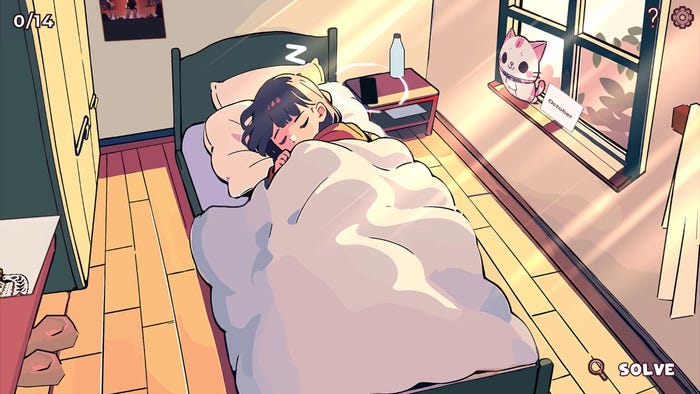
Featured Blog | This community-written post highlights the best of what the game industry has to offer. Read more like it on the Game Developer Blogs.
Let’s produce HTML5 games with a serious approach.
Can we use games in science, rehabilitation, and education? Can we use potential of HTML5 cross platform feature in those areas? I'd like to answer those question in a blog entry below.

Most of gamers use to playing entertaining, funny, or not very engaging games. The aim of such games is pure relax and escape from everyday duties and efforts. But it doesn't work in all cases this way. Presently, we are seeing very fast growth of the mobile market with more and more variations of apps and games showing up to compete for interested customers. HTML5 gaming became one solution which can change the approach to game production. With the great advantage of cross platform features, HTML5 developer products can work on almost any platform we like. Any interactive standalone or mobile device with browser support can become a platform for HTML5 games. This potential can be used in many ways. Cross platform games can entertain, but they can also teach, help with experiments, or show new solutions to people of all ages. What I'm trying to prove here is that mobile gaming doesn't have to be only "a pig shooting contest", but it can also be a journey presenting a great experience for youngsters or allow exploration for the elderly who don't have as much experience as the younger generations.
Education & gaming - how it would work?
Inspiration for this article came from a blog entry I stumbled across lately. The serious side of playing games unveils how serious games can be. We often hear, "Games are bad, don't play them, they make you stupid and aggressive." I wouldn't agree with that. Of course we can notice productions that aren't appropriate for certain age, or the game can be so bad and offensive that it can teach gamers something negative. But here I would like to prove that with the proper approach to gaming, we can achieve much more than many education systems have in the past. Quote from Euro News article by Zachary Sherin, an undergraduate student explains:
“Certain types of education, the old ones using text books are being shoved aside by new, interactive media. Games have an incredible potential to gather people’s interest in topics that they might not otherwise enjoy.”
This MIT student was taking part in a process of “A Slower Speed of Light” development, a game which explains the theory of relativity by enabling gamers to experience it. You can now imagine, how big an influence on young students this kind of education can have. Even an unimaginable process, which in books or on paper or boards would be difficult to explain, can be explained faster in a game because it activates receptors responsible for understanding faster. Students can imagine the most complicated processes in a very cool and plain way. Isn't that better? Such research is also a great way to lead in technology development. Colleges and schools don't have to stick to the old methods. I believe that students would be much more interested in science, biology, history, and other school subjects if more smart gaming would appear in classrooms.
Now, how can the HTML5 technology help here? Imagine that on each desk you can find a tablet (It may also be a student's private device or smartphone), and the teacher enables access to a web application during lectures. All of the students access the application and can be a part of an experiment. For example, they can play a game which explains how the immunology systems works in the human body. They may be divided into teams, in which part of students are germs and the other part are antibodies which defend the body. All of the participants would play this game simultaneously in one gaming area, no matter what device they use. What's more, they don't even have to be in the classroom! A teacher can expand this experiment for longer period of time and reward those who have the best scores and understanding of the topic. That's only an example, but only the imagination can limit us here.
There are already many examples of such educational gaming approach. Especially we see it in Toddlers - which is a term for applications/games created especially for small children. As an example of HTML5 development approach I found Terrabook, a Korean company which specializes in building educational mobile apps for kids. I noticed that there are many native Toddlers already available on the market, and I believe that HTML5 mobile apps/games for kids can be also a great solution. Every parent can access them much faster just by clicking the link and having them always available in any place of the apartment. A web mobile Toddler as a cross platform app can be watched as a bedtime story on a tablet in a child's room, or it can be used when we need to keep children focused and we can watch it with them on a Smart TV in our bedroom. Sounds really great, and it helps expand a child's intelligence and imagination. It could be used for example for learning the ALPHABET.
An educational mobile gaming approach can also be used in different situations among a variety of target groups. Elderly people can prevent themselves from dementia thanks to engaging with games and applications that encourage brain usage. The same solution can be used in a special care facility where people with certain disorders can activate their brain activity faster or recuperate. Imagination becomes the only limitation in the process for creating these types of games and apps. I believe that in this situation, many companies can raise or are already raising resources for private and government financed interactive education. Games aren't only a time wasting monster.. If they are used in a good way, they may bring a lot of benefit to developers and the people who use them. Educational games can fill the gap and create new business solutions for HTML5 gaming market, and in this situation we can see a brighter future for web based gaming.
Read more about:
Featured BlogsAbout the Author(s)
You May Also Like









